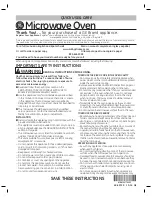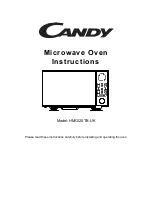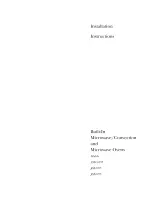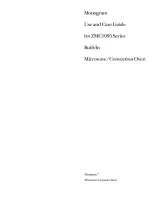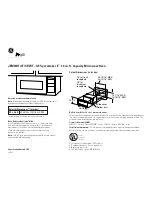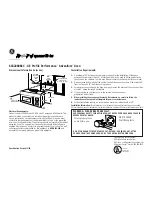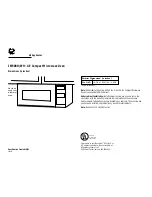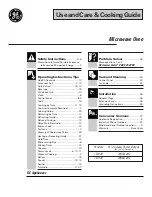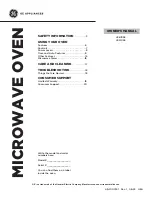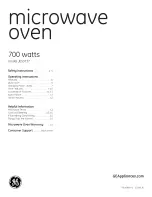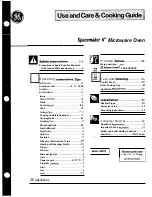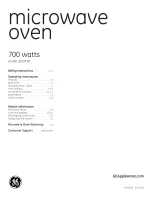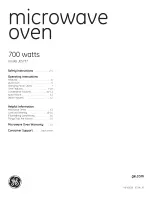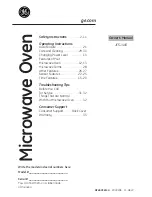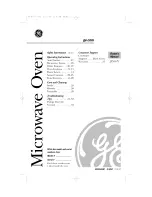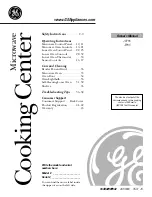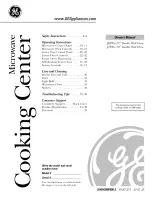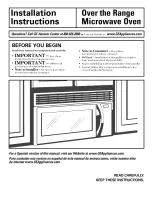
2
IMPORTANT SAFETY INSTRUCTIONS.
READ ALL INSTRUCTIONS BEFORE USING.
SAVE THESE INSTRUCTIONS
OPERATING AND CLEANING (Continued)
— Some products such as whole eggs and sealed
containers—for example, closed jars—are able to explode
and should not be heated in this microwave oven.
— Do not cover the microwave rack or any part of the
oven with metal foil. This will cause overheating of the
microwave/convection oven.
— Cook meat and poultry thoroughly—meat to at least an
INTERNAL temperature of 160°F and poultry to at least
an INTERNAL temperature of 180°F. Cooking to these
temperatures usually protects against foodborne illness.
— Make sure all cookware used in your microwave oven is
suitable for microwaving. Most glass casseroles, cooking
dishes, measuring cups, custard cups, pottery or china
dinnerware which does not have metallic trim or glaze
with a metallic sheen can be used.in compliance with
cookware manufacturers’ recommendations.
— It is important to keep the area clean where the door
seals against the microwave. Use only mild, nonabrasive
detergents applied with a clean sponge or soft cloth.
Rinse well.
SUPERHEATED WATER
n
Liquids, such as water, coffee, or tea, are able to be over-
heated beyond the boiling point without appearing to be
boiling. Visible bubbling or boiling when the container is
removed from the microwave oven is not always present.
THIS COULD RESULT IN VERY HOT LIQUIDS SUDDENLY
BOILING OVER WHEN THE CONTAINER IS DISTURBED OR A
SPOON OR OTHER UTENSIL IS INSERTED INTO THE LIQUID.
To reduce the risk of injury to persons:
— Do not overheat the liquid.
— Stir the liquid both before and halfway through heating it.
— Do not use straight-sided containers with narrow necks.
— After heating, allow the container to stand in the
microwave oven for a short time before removing the
container.
— Use extreme care when inserting a spoon or other utensil
into the container.
USE OF THE MICROWAVE RACK ACCESSORY
— Remove the microwave rack from the oven when not in
use.
— Use pot holders when handling the microwave rack and
cookware. They may be hot.
— Be sure that the microwave rack is positioned properly
inside the oven to prevent product damage.
The fan will operate automatically under certain conditions.
Take care to prevent the starting and spreading of
accidental cooking fires while the vent fan is in use.
n
Clean the underside of the microwave often. Do not allow
grease to build up on the microwave or the fan filters.
n
In the event of a grease fire on the surface units below
the microwave oven, smother a flaming pan on the
surface unit by covering the pan completely with a lid, a
cookie sheet or a flat tray.
n
Use care when cleaning the vent fan filters. Corrosive
cleaning agents, such as lye-based oven cleaners, may
damage the filters.
n
When preparing flaming foods under the microwave, turn
the fan on.
n
Never leave surface units beneath your microwave
oven unattended at high heat settings. Boilovers cause
smoking and greasy spillovers that may ignite and spread
if the microwave vent fan is operating. To minimize
automatic fan operation, use adequate sized cookware
and use high heat on surface units only when necessary.
VENT FAN
PACEMAKERS
Most pacemakers are shielded from interference from electronic products, including microwaves. However, patients
with pacemakers may wish to consult their physicians if they have concerns.
n
Plug microwave into a grounded 3-prong outlet.
n
Do not remove the ground prong or use an adapter.
n
Do not use an extension cord.
Improper use of the grounding plug can result in a risk
of electric shock.
This appliance must be grounded. In the event of an
electrical short circuit, grounding reduces the risk of electric
shock by providing an escape wire for the electric current.
This appliance is equipped with a power cord having a
grounding wire with a grounding plug. The plug must
be plugged into an outlet that is properly installed and
grounded.
Consult a qualified electrician or service technician if the
grounding instructions are not completely understood,
or if doubt exists as to whether the appliance is properly
grounded.
A short power-supply is provided to reduce the risks
resulting from becoming entangled or tripping over a longer
cord. Do not use an extension cord with this appliance. If
the power cord is too short, have a qualified electrician or
service technician install an outlet near the appliance.
GROUNDING INSTRUCTIONS
WARNING
To prevent risk of electric schock, follow these instructions:

